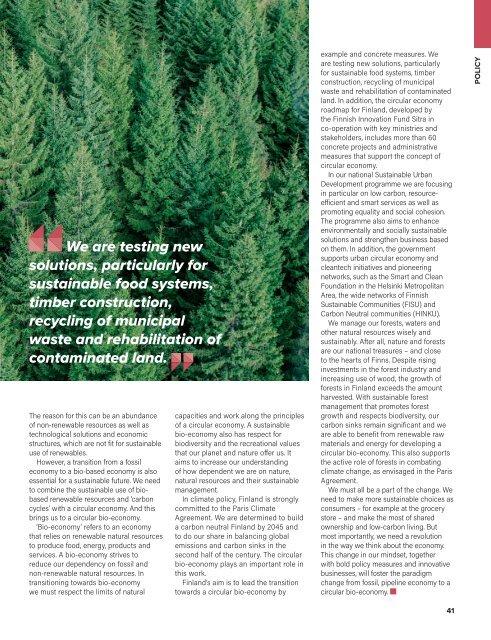Climate Action 2017-2018
Create successful ePaper yourself
Turn your PDF publications into a flip-book with our unique Google optimized e-Paper software.
We are testing new<br />
solutions, particularly for<br />
sustainable food systems,<br />
timber construction,<br />
recycling of municipal<br />
waste and rehabilitation of<br />
contaminated land.<br />
The reason for this can be an abundance<br />
of non-renewable resources as well as<br />
technological solutions and economic<br />
structures, which are not fit for sustainable<br />
use of renewables.<br />
However, a transition from a fossil<br />
economy to a bio-based economy is also<br />
essential for a sustainable future. We need<br />
to combine the sustainable use of biobased<br />
renewable resources and ‘carbon<br />
cycles’ with a circular economy. And this<br />
brings us to a circular bio-economy.<br />
‘Bio-economy’ refers to an economy<br />
that relies on renewable natural resources<br />
to produce food, energy, products and<br />
services. A bio-economy strives to<br />
reduce our dependency on fossil and<br />
non-renewable natural resources. In<br />
transitioning towards bio-economy<br />
we must respect the limits of natural<br />
capacities and work along the principles<br />
of a circular economy. A sustainable<br />
bio-economy also has respect for<br />
biodiversity and the recreational values<br />
that our planet and nature off er us. It<br />
aims to increase our understanding<br />
of how dependent we are on nature,<br />
natural resources and their sustainable<br />
management.<br />
In climate policy, Finland is strongly<br />
committed to the Paris <strong>Climate</strong><br />
Agreement. We are determined to build<br />
a carbon neutral Finland by 2045 and<br />
to do our share in balancing global<br />
emissions and carbon sinks in the<br />
second half of the century. The circular<br />
bio-economy plays an important role in<br />
this work.<br />
Finland’s aim is to lead the transition<br />
towards a circular bio-economy by<br />
example and concrete measures. We<br />
are testing new solutions, particularly<br />
for sustainable food systems, timber<br />
construction, recycling of municipal<br />
waste and rehabilitation of contaminated<br />
land. In addition, the circular economy<br />
roadmap for Finland, developed by<br />
the Finnish Innovation Fund Sitra in<br />
co-operation with key ministries and<br />
stakeholders, includes more than 60<br />
concrete projects and administrative<br />
measures that support the concept of<br />
circular economy.<br />
In our national Sustainable Urban<br />
Development programme we are focusing<br />
in particular on low carbon, resourceeff<br />
icient and smart services as well as<br />
promoting equality and social cohesion.<br />
The programme also aims to enhance<br />
environmentally and socially sustainable<br />
solutions and strengthen business based<br />
on them. In addition, the government<br />
supports urban circular economy and<br />
cleantech initiatives and pioneering<br />
networks, such as the Smart and Clean<br />
Foundation in the Helsinki Metropolitan<br />
Area, the wide networks of Finnish<br />
Sustainable Communities (FISU) and<br />
Carbon Neutral communities (HINKU).<br />
We manage our forests, waters and<br />
other natural resources wisely and<br />
sustainably. After all, nature and forests<br />
are our national treasures – and close<br />
to the hearts of Finns. Despite rising<br />
investments in the forest industry and<br />
increasing use of wood, the growth of<br />
forests in Finland exceeds the amount<br />
harvested. With sustainable forest<br />
management that promotes forest<br />
growth and respects biodiversity, our<br />
carbon sinks remain significant and we<br />
are able to benefit from renewable raw<br />
materials and energy for developing a<br />
circular bio-economy. This also supports<br />
the active role of forests in combating<br />
climate change, as envisaged in the Paris<br />
Agreement.<br />
We must all be a part of the change. We<br />
need to make more sustainable choices as<br />
consumers – for example at the grocery<br />
store – and make the most of shared<br />
ownership and low-carbon living. But<br />
most importantly, we need a revolution<br />
in the way we think about the economy.<br />
This change in our mindset, together<br />
with bold policy measures and innovative<br />
businesses, will foster the paradigm<br />
change from fossil, pipeline economy to a<br />
circular bio-economy.<br />
41<br />
POLICY












